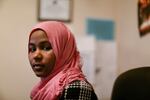
Isatou Jallow sits at her desk inside her office.
John Rosman / OPB
Isatou Jallow came to the United States two years ago from Gambia, a small country in West Africa, to study.
She's learned far more than she expected.
"What you see in the movies, it's all Hollywood and skyscrapers," Jallow said. "Obviously, that's what you expect to see. But it's very different. When you come here, the first thing people tell you is, 'Oh, people are not going to accept you because you're wearing the head scarf. You have to take that off.'"
At first, she thought that was silly. In Gambia, she says, Muslims and Christians mingle freely. Her father is a liberal Muslim. She only began covering her head in high school when she became serious about her faith.
"For me, what it means for me to be a Muslim is like guidance," Jallow said. "It has guided me a lot to be the person that I am. It's guided me to be tolerant of other persons and their beliefs. It's guided me to be more peaceful, inside and out."
She’s needed that peace here. Sometimes, she says, people can be dense about Africa.
“When I introduce myself in class, they ask really weird questions. I had one time a guy corner me outside class, asking me if it's really cool that I get to see lions all the time. It's really weird, because I know I only saw a lion in the zoo back home.”
Sometimes, she hears comments that go far beyond a simple ignorance about what another continent is like.
“I was coming to work, I was at the 82nd Avenue MAX station. This guy walked up to me and asked me if I knew who Saddam Hussein or who Bin Laden was. I've only heard about these in the news, so it was very disturbing.
He kept on walking toward me, approaching me, yelling and screaming, 'You go back to Islam, or something like that.' I thought he was going to punch me or something, I was really scared.
There were people around there, and no one walked up to say 'stop what you're doing.' And that left in my mind, what if I was white? What if I was a white girl standing there and someone was approaching me? Would it have been different? Would people have stopped him?”
This was neither the first nor the last time that random strangers harassed Jallow, a tiny, soft-spoken woman, presumably because of her head scarf. She’s had people roll down their car windows to yell at her, things like “Go back where you came from,” and simply, “ISIS.” The comments usually spike after a terrorist attack.
“When I hear about a shooting, the first thing I'm thinking is, 'Please don't be Muslim, please don't be Muslim.' And when I see a Muslim name, it just crushes me."”
Jallow, who hopes to eventually earn a master's degree here and then return home to start a nonprofit service organization, has found a lot to like about the United States. When she's not in school at Portland Community College, she works to help other newcomers to Oregon with the Immigrant and Refugee Community Organization.
During her two years here, she’s made new friends and experienced new things.
But living in the United States has changed how she feels about race.
“Back home I never saw myself as any different. But then when you come here, you're like, 'person of color?' You wonder, 'I didn't know I was colored or I was different in some way.' But here it gets pointed out to you.
When you go out at night or any time of the day, you see someone wearing a hoodie, and they're black, there's this fear that's in you. That's because that's what you've been taught to believe, that black people are dangerous. And I feel guilty, because I'm black, and I'm supposed to support my race, but sometimes I do feel that little fear when I'm walking at night and someone of color approaches me."”